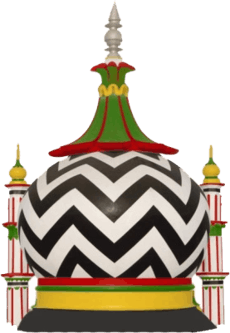Bahar-e-Shariat
Bahar-e-Shariat (1939) is an encyclopedia of Islamic fiqh (jurisprudence), according to the Hanafi school, spreading over 20 volumes. Seventeen of its volumes were written by Mufti Amjad Ali Aazmi, a disciple of Imam Ahmed Raza Khan.[1] The final three books were compiled by his disciples after his death. The book is written in simple Urdu. Laymen, clerics and research scholars, all find it a complete book of Islamic Sharia with 11624 topics explained briefly yet lucidly.[2][3]
It was originally written for women and children, but now is studied across Islamic schools. Jurist also rely on the rulings given in the book. The first volume of this Book mainly concentrates on basic principles of Islam. There are separate parts for Namaz, Aqida, Taharat, Roza, Zakat and Haj. The second part includes topics like Talaq (Divorce) and Khula, (trade matters involving buying and selling of goods) and Kufria sentences etc. Parts 14 to 20 are compiled in the third volume, which includes topics such as Inheritance, Qassas, Diyat etc. The topics encompassing the whole life of a person are discussed by the author.[4][5]
In 2010, 100 years celebration of Bahar-e-Shariat is celebrated by authors son. The book has been published by many publishers across India and Pakistan. Maulana Ilyas Attar Qadiri's Dawat-e-Islami has done work on a computerized version [6][7]
See also
References
- ↑ +Umer Sarwar. "Bahar e Shariat Book by Amjad Ali Aazmi". Download Hub.
- ↑ Moulana Mohammad Iliyas Attar Qadri. Method of Salah. TANVEER AHMED. pp. 123–. GGKEY:41U7ZHH6L4N.
- ↑ Rahman, Tariq. "Language, Religion and Politics". revues.org.
- ↑ "Bahar-e-Shariat - Talaaq (Vol 8)". nmu.org.ua.
- ↑ http://www.bookhut.net/bahar-e-shariat-urdu-pdf-complete/
- ↑ +Umer Sarwar. "Bahar e Shariat Book by Amjad Ali Aazmi". Download Hub.
- ↑ http://www.jstor.org/stable/40279110
